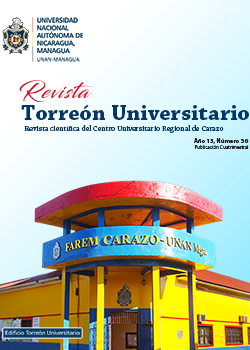Role of pedagogical mediation in the process of learning Spanish as a foreign language
DOI:
https://doi.org/10.5377/rtu.v13i38.19300Keywords:
I am learning, strategies, teaching spanish as a foreign language, pedagogical mediation and learnersAbstract
Pedagogical mediation as a strategy for learning a foreign language is an option that favors both the learner and the teacher so that effective acquisition is carried out. Hence, this article presents a brief analysis of pedagogical mediation based on theoretical-practical elements related to the teaching-learning process. The objective was to analyze the perception of the main actors of the teaching-learning act on the importance of pedagogical mediation to achieve the scope of competencies and meet the interests of the learners. The research was carried out using a qualitative approach and a larger unit of analysis was identified: pedagogical mediation as a teaching-learning strategy. In the same way, minor units: pedagogical mediation from a vision focused on know-how and pedagogical mediation focused on school performance and pedagogical experiences within an education centered on being. For the analysis of the data, a double-entry matrix was developed. Also, triangulation of the information was applied, considering the objectives, research questions, and units of analysis. This article presents a description of elements of some conceptual positions that teachers and principals have on the concept of pedagogical mediation and its implication in the learning process. It also explains how the actors in charge of carrying out teaching consider which school actions and experiences learning can be carried out and their relationship with the interests of the learners.
Downloads
257
HTML (Español (España)) 154
PDF 57
HTML 43
References
Hernández Sampieri, R., Fernández, C., & Baptista, F. (2014). Metodología de la Investigacion. Mexico: McGrawHil.
Lantolf, J., & Beckett, T. (2009). Sociocultural theory and second language acquisition.
Lawsy, K., & McLeod, R. (28 de noviembre de 2014). Case study and grounded theory: Sharing some alternative qualitative research methodology with systems professionals. 29, 12.
Madrid, D., Hockly, N., & Pueyo, S. (2010). Metodología de investigación en el aula de ELE. Funiber.
Maturana, H. (1998). Realidad: ¿Objetiva o construida? Guadalajara: Instituto Tecnológico y de Estudios Superiores de Occidente ITESO.
Piñuel, R., & Gaitán, C. (2010). Investigación, comunicación y universidad. Salamanca: Comunicación Social.
Solís, J. (2013). El análisis documental como eslabón para la recuperación de información y los servicios. Barcelona, España. http://www.monografias.com/
trabajos14/analisisdocum/analisisdocum.shtml
Tebar, L. (2014). El profesor mediador del aprendizaje. Bogotá, Colombia: Magisterio Editorial.
Downloads
Published
How to Cite
Issue
Section
License
Copyright (c) 2024 National Autonomous University of Nicaragua, Managua

This work is licensed under a Creative Commons Attribution-NonCommercial-NoDerivatives 4.0 International License.
Los autores que publican en esta revista están de acuerdo con los siguientes términos.
- El autor o los autores de los artículos, ensayos o investigaciones conceden a la Universidad Nacional Autónoma de Nicaragua, Managua (UNAN-Managua) los derechos de edición (copyright) del trabajo enviado, por consiguiente la Universidad cuenta con el derecho exclusivo para publicar el artículo durante el periodo completo de los derechos de autor.
- Estos derechos de autor/ autores autorizan a la Revista Torreón Universitario y a la Universidad editar y divulgar/publicar el artículo en dicha Revista, incluyendo reproducción impresa y electrónica, el almacenamiento, recuperación y cualquier otro tipo de publicación, y fuentes de información secundaria como servicios de resúmenes y bases de datos, así mismo la facultan a proteger el artículo contra el uso no autorizado para su difusión por medios impresos o electrónicos (PDF, HTML, EPUB, XML u otros).
Licencia para el uso del contenido
La revista hace uso de la Licencia Creative Commons Atribución-NoComercial-SinDerivar 4.0 Internacional.
Bajo esta declaración:

Este revista está sujeta a una licencia de Creative Commons Reconocimiento-NoComercial-SinObraDerivada 4.0 Internacional. Puede ser copiada, distribuida y transmitida públicamente siempre y cuando se cite al autor y la fuente (Revista Torreón Universitario), no debe modificarse ni utilizarse con ningún fin comercial. La licencia completa se puede consultar en http://creativecommons.org/licenses/by-nc-nd/4.0/.



